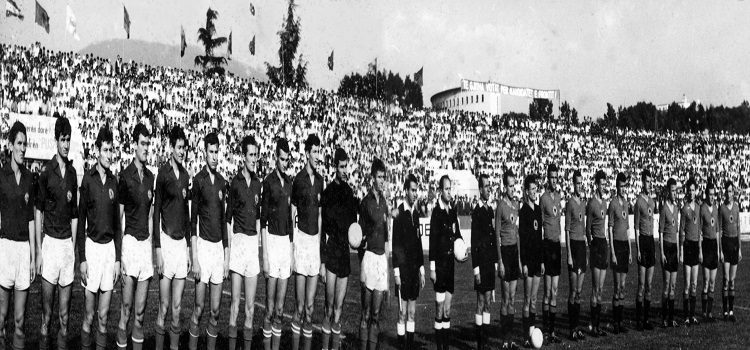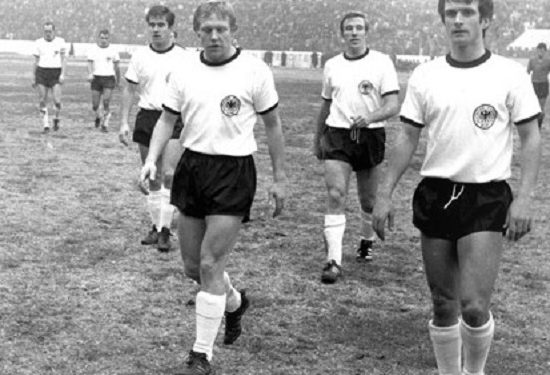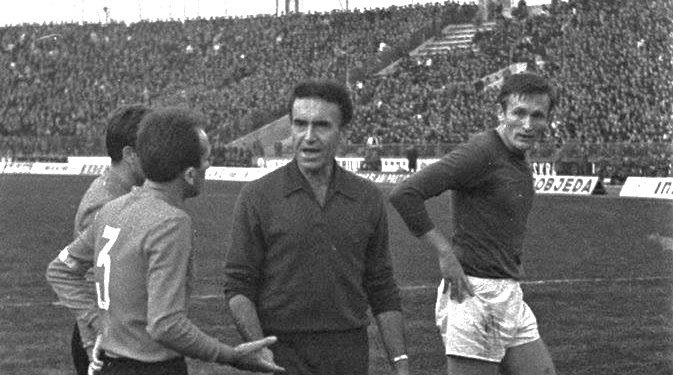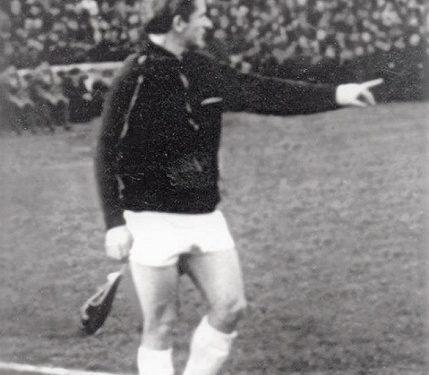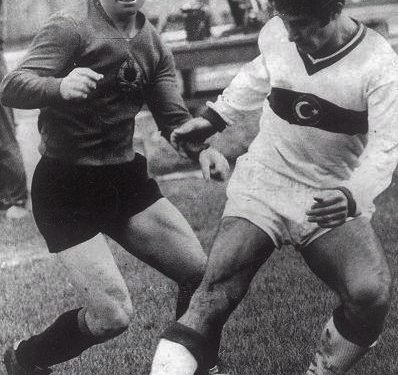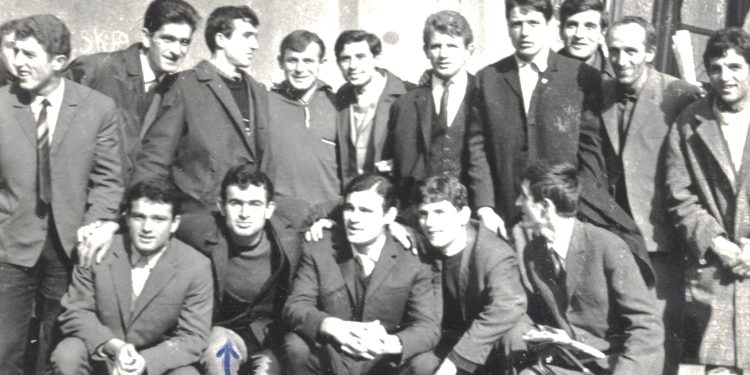Part Five
Memorie.al / And who today would not want to return to those years of the last century, to bring forth the impressive and historical panorama-memory, the distinguished elite of Albanian sports, those who made the history of Albanian football, the legendary footballers and heroes of their time, who with intelligence, passion, talent, and professionalism, managed to write history at the national, European, and global level. Some of them rest in eternal peace, some of them are still there today – noble and proud, idols and legends – they are and will remain major figures, not only for the generation they belonged to and the future, but also for those dreamers, the young athletes, who wish to emulate them; those who created an epoch! Among them is the legend, the icon of Korça and Albanian football – the insurmountable, Teodor Vaso – a dominant sports figure in national and international matches, who brought fame and history to a more professional, spectacular, historical, and mythical football of the last century!
Continued from the previous issue
– Prof. Vaso, this year the Euro 2024 draw put us in a difficult group. We also have matches with Serbia, which historically have had a problematic specificity. The last meeting took place 47 years ago. What memories do you have from the matches with Yugoslavia?
It shouldn’t have been, just as no one should repeat it several times today. The inspiration to serve Albania was an inexhaustible source of self-sacrifice, for a total dedication, just as it happened. One day before the match, the giants of the football game appeared at the “Dinamo” stadium. An extraordinary crowd of sports fans poured in from all sides of the city of Tirana. They wanted to see the greats before their eyes and at their feet: Beckenbauer, Schulz, Overath, Netzer, Weber, Held, etc.
They were looking for Beckenbauer in the group of German players, but he wasn’t there. The match was awaited, not only as a sporting competition but also as a confrontation between two rival worlds. Skeptics shouted slogans: “the fly will fight the bear”! The audacity of the brave rose to claims reaching the zenith: “We will win, because we once won the war”! Dreamers and the curious, with and without tickets, poured in from all regions of Albania, as tickets sold out as soon as they went on sale. Black market trading was done at the Clock Tower.
With prices multiplied, tickets were snatched up, exchanged for coats, shirts, watches, wristwatches, bicycles, and shoes. Fear suppressed the great smuggling. The stadium clock board showed the figures 0–0 when the final whistle blew for the game with the Federal Republic of Germany. Some of the German players fell to their knees. The Western Germans were saved peacefully, because the match referee, who was Austrian, pretended not to see the goal in the FRG’s net in the 52nd minute. For this match, a foreign news agency (which our press did not specify the name of, for some reason), wrote: “The visitors’ goal barely escaped a one hundred percent favorable chance for a goal.”
In fact, it was a goal, and it was photographed as a goal. The Vice President of the FRG Football Federation declared: “We found a very strong opponent. I am surprised by your strength. You played beautifully, smartly, and decisively.” Meanwhile, the great coach Helmut Schön stated: “Once again, congratulations to Albania, to Albanian football, and to the good team with great fighting spirit. I liked Shllaku, Pano, Mema, Zhega, and Vaso.”
“For 60 whole minutes, our national team played with barely 10 men, due to the serious trauma of Teodor Vaso, who was excellent until the accident. However, determined for 60 whole minutes, he stayed on the field, sacrificing himself, just to give everything to the team.” This is what the three authors, journalists Besnik Dizdari, Ismet Bellova, and Osman Palushi, wrote in the book “Our Sport.” The West Germans whom we eliminated wrote a lot about this match, absurdly hinting: “You played to serve the Yugoslavs that are why you eliminated us!”
There has been much talk by political sports speculators about the presence of high party or state figures in the football teams. Before the match, in the minutes leading up to the field entry, only the company of Captain Lin Shllaku with Ramiz Alia (Secretary of the Central Committee of the APL) was seen. This event and the draw with the FRG caused a stir in world sports circles. The legendary Albanian sports commentator, Ismet Bellova, in his book “SPORT AND FRIENDSHIP,” writes, among other things: “That unyielding spirit and admirable determination of our footballers on the green field have been remembered and have lived on for a long time.”
Even the 0-0 result, which was a precious victory for us, has never been prioritized over the high moral and volitive qualities that our footballers demonstrated, and they have remained beautiful and unforgettable characteristics in the minds and hearts of thousands of sports fans. That match is recognized as one of the most fiercely fought and most emotional in our football history. After 47 years and after 13 matches with the FRG, we have not taken a single point in any of the matches. The victory against Torino, in the dimensions of a champion from a state with extraordinary football traditions, like World Champions, has no second example until now in the history of Albanian football, unique and unrepeated.
Yugoslavia and Serbia, not only as states, but especially in football, have major differences. Serbia no longer has the footballers of Slovenia, Croatia, and Kosovo (Fadil Vokrri), who escalated Yugoslavia higher and higher in major international competitions. Their players have shown in world duels that their value gave a lot of footballing capacity to the Yugoslav game, which played with us in Tirana, won 2-0, faced Italy in the final of the European Championship, drawing 1-1, inside Italy, in a dramatic match. In this match, the two greats scored: Luigi Riva and the Serb, Dragan Džajić, who did not score any of the 4 goals scored against us in Belgrade.
The draw in the final required a replay, and it happened two days later, on June 10, 1968. The Italians won with two goals scored by Domenghini and Anastasi. But what about Serbia today? The depth of technical interpretations should be done by specialists covering the tracking of rival teams. From the viewpoint of a specialist, concerning other issues, the psychological characteristics of a match between two states where there are still residues from the past must be specified, but not of the character they once had, where many considered them enemies. Despite the fact that Serbia has been playing alone as a state for only a few years, it must be clearly stated that its football factory and its club teams have produced high-level European players.
If Denmark, the former European champion, and Portugal, with its world star Ronaldo and a very productive past, are very difficult obstacles to overcome, Serbia remains the only alternative to provide the possibility of a qualification formula. The match inherently has objective factors: the pitch, which is ours and which affects the growth of the footballing capacities of the game. Also, the other side is the participation of our Kosovar players; without inclining to fantasize negatively, they must remain calm when playing against footballers who personally have no residues against Kosovo and the Kosovar players, but indirectly represent a country that exercised genocide in Kosovo.
Intense sporting play borders on violent actions, so it is up to the team’s psychologists to deal with this problem. The great match against the Federal Republic of Germany in 1967, against Denmark (1-0), in 1963, against Belgium 2-0 in 1984, against Greece, the victories in Athens in 1991, and in Tirana in 1992, are victories that indicate possibilities for winning again. However, we must recognize that matches are not fully understood without the revelation that gives you the opportunity to see the unexpected.
– Are you satisfied with what you achieved at that time? What was the most difficult moment for Todo Vaso?
I belong to the countless generations of people engaged nearly a century ago (since 1909) for the smooth running and development of sports in Albania. This long time allows me to remember many of them: Zihni Gjinali, Osman Caslli, Lym Alla, Pilo Qirinxhi, Maqo Prodani, Stavri Tole, Ilia Shuke, Loro Boriçi, Rexhep Spahiu, Refik Resmja, Kolec Kraja, Miço Ndini, Zyber Konçi, Skënder Dedja, S. Koça, P. Mile, A. Deliu, M. Tuxhari, Aleko Pilika, Skënder Jareci, and hundreds of teammates over a period of over 15 years, and a protagonist who was the captain of the Korça team for seven years. Satisfaction cannot be fully achieved, because in that way you are at the absolute, inconceivable limit.
I started with the youth of Tirana, and we were crowned champions. I succeeded, through my dedicated qualities and work, to be appreciated by specialists and coaches, and to be included in the composition of the adult teams “Dinamo,” “17 Nëntori,” “Skënderbeu,” “Partizani,” and the national football teams for youth, hopes, and the Albanian national team. I don’t feel well if I am only satisfied with sporting achievements. I feel highly respected, not only for the sports name, but because along with it, through the behavior and education from my family and culture from school, as well as society, the respect, and appreciation of spectators and sports-loving people, has accompanied me in all public environments.
I feel approved for the time after leaving the football field. I devoted energy, knowledge, work, and dedication to hundreds of child, youth, and adult footballers and students, the elite of whom went on to represent teams of all ages and adult teams, in many football clubs in Albanian cities and abroad. Here are some of them: Dhimitër Xhambazi, Milutin Kërcic, Pandi Tole, G. Muhaxhiri, Gergji Kushe, Bledi Shkëmbi, Paulin Dhëmbi, Ligor Tiko-Stavrian Lako, Rigels Qose, Bledi Kadiu, B. Vila, etc. This career in the city of Korça and throughout Albania is valued by addressing me with the title “Professor.”
I mention it because it is truly an honor for a commitment and work that has left valuable traces. The most difficult moment was when I was laid off, and that same year (1996), the second blow came. My daughter, who was enjoying her diploma with absolute 10s for all her years at the “Raqi Qirinxhi” gymnasium, an average for the “Gold Medal,” had her application for studies at the Faculty of Law in Tirana denied. The time of people’s biographies being scrutinized for the time before 1944 and the snags in the people’s power had passed, but now the biographies in power were being looked at. Thus, out of 11 applicants with an average grade of 10, 10 applicants won; out of all 160 applicants, 60 won, only Praksiela Vaso, Teodor Vaso’s daughter, did not win the right to study!
I asked Prime Minister Aleksandër Meksi to correct the absurd injustice. Even today, I don’t know if they gave him my letter or not. The pedagogue Stavri Çeçe, who is also my best friend, at the Faculty of Law, told me: “Don’t wander around Tirana; the lists of study rights come from the respective districts, and you know who makes them. In every city, thousands of people get water from the network taps, but only one person holds the main key to them, the person who receives the order for implementation from the state, and that person is never alone!”
“Sir, you honor us by wanting to send this girl, with this excellent diploma, to study at our Arab universities.” The Ambassador of the Egyptian Embassy in Tirana welcomed me with these words. “You gave the scholarship, and you did us a great honor,” I continued, thanking him. Dr. Bujar Isaku, the chairman of the Korça branch of the Democratic Party at the time, listened to my verbal complaints with respect and consideration.
What are inconceivable lies in the contrast between the two systems? During the dictatorship, all my teacher colleagues, from all categories, were not only employed, but they were in the best schools in the city. What was happening to me in this democratic system? “An injustice has been done, a serious mistake, it will be fixed,” they told us. It turned out that way, but my daughter never received an answer, even when the reserve additions were made available to the Prime Minister.
– What is your message for the sports-loving public and the dreamers, the young footballers…
– We live in a time when many foreigners have anathematized the culture and honor of our people due to many events after 1990. The numerous people in the stadium are a source that generates the wisdom, education, and moral purity of the people, of which they are a part. We must show the world that we are an emancipated people and do not condone acts of hooliganism, which are anti-sport. With our behavior and kindness, culture, and love for sports and football, let us become an obstacle to unrestrained actions, so that the matches unfold within the framework of a fierce but clean battle in behavior towards rivals. This is the true mission of sport historically./ Memorie.al




